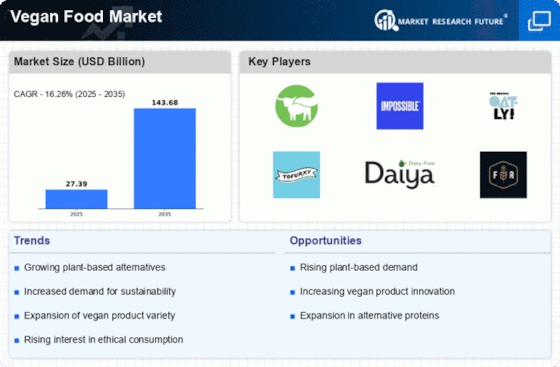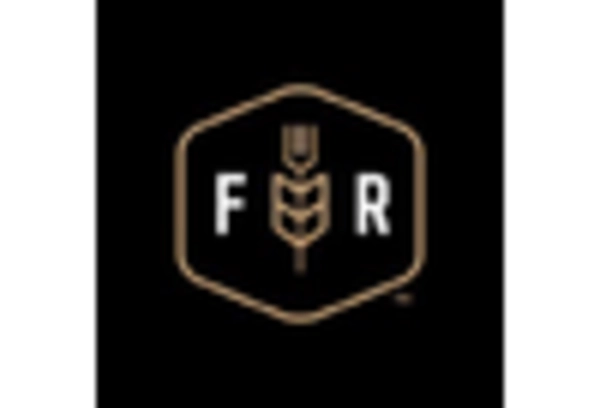Vegan Meat
Dairy Alternatives
Plant-Based Snacks
Vegan Sauces
Vegan Bakery Products
Supermarkets/Hypermarkets
Online Retail
Specialty Stores
Convenience Stores
Frozen
Chilled
Shelf-Stable
Children
Adults
Seniors
North America
Europe
South America
Asia Pacific
Middle East and Africa
North America Outlook (USD Billion, 2019-2035)
Vegan Food Market by Product Type
Vegan Meat
Dairy Alternatives
Plant-Based Snacks
Vegan Sauces
Vegan Bakery Products
Vegan Food Market by Distribution Channel Type
Supermarkets/Hypermarkets
Online Retail
Specialty Stores
Convenience Stores
Vegan Food Market by Form Type
Frozen
Chilled
Shelf-Stable
Vegan Food Market by Consumer Age Group Type
Children
Adults
Seniors
Vegan Food Market by Regional Type
US
Canada
US Outlook (USD Billion, 2019-2035)
Vegan Food Market by Product Type
Vegan Meat
Dairy Alternatives
Plant-Based Snacks
Vegan Sauces
Vegan Bakery Products
Vegan Food Market by Distribution Channel Type
Supermarkets/Hypermarkets
Online Retail
Specialty Stores
Convenience Stores
Vegan Food Market by Form Type
Frozen
Chilled
Shelf-Stable
Vegan Food Market by Consumer Age Group Type
Children
Adults
Seniors
CANADA Outlook (USD Billion, 2019-2035)
Vegan Food Market by Product Type
Vegan Meat
Dairy Alternatives
Plant-Based Snacks
Vegan Sauces
Vegan Bakery Products
Vegan Food Market by Distribution Channel Type
Supermarkets/Hypermarkets
Online Retail
Specialty Stores
Convenience Stores
Vegan Food Market by Form Type
Frozen
Chilled
Shelf-Stable
Vegan Food Market by Consumer Age Group Type
Children
Adults
Seniors
Europe Outlook (USD Billion, 2019-2035)
Vegan Food Market by Product Type
Vegan Meat
Dairy Alternatives
Plant-Based Snacks
Vegan Sauces
Vegan Bakery Products
Vegan Food Market by Distribution Channel Type
Supermarkets/Hypermarkets
Online Retail
Specialty Stores
Convenience Stores
Vegan Food Market by Form Type
Frozen
Chilled
Shelf-Stable
Vegan Food Market by Consumer Age Group Type
Children
Adults
Seniors
Vegan Food Market by Regional Type
Germany
UK
France
Russia
Italy
Spain
Rest of Europe
GERMANY Outlook (USD Billion, 2019-2035)
Vegan Food Market by Product Type
Vegan Meat
Dairy Alternatives
Plant-Based Snacks
Vegan Sauces
Vegan Bakery Products
Vegan Food Market by Distribution Channel Type
Supermarkets/Hypermarkets
Online Retail
Specialty Stores
Convenience Stores
Vegan Food Market by Form Type
Frozen
Chilled
Shelf-Stable
Vegan Food Market by Consumer Age Group Type
Children
Adults
Seniors
UK Outlook (USD Billion, 2019-2035)
Vegan Food Market by Product Type
Vegan Meat
Dairy Alternatives
Plant-Based Snacks
Vegan Sauces
Vegan Bakery Products
Vegan Food Market by Distribution Channel Type
Supermarkets/Hypermarkets
Online Retail
Specialty Stores
Convenience Stores
Vegan Food Market by Form Type
Frozen
Chilled
Shelf-Stable
Vegan Food Market by Consumer Age Group Type
Children
Adults
Seniors
FRANCE Outlook (USD Billion, 2019-2035)
Vegan Food Market by Product Type
Vegan Meat
Dairy Alternatives
Plant-Based Snacks
Vegan Sauces
Vegan Bakery Products
Vegan Food Market by Distribution Channel Type
Supermarkets/Hypermarkets
Online Retail
Specialty Stores
Convenience Stores
Vegan Food Market by Form Type
Frozen
Chilled
Shelf-Stable
Vegan Food Market by Consumer Age Group Type
Children
Adults
Seniors
RUSSIA Outlook (USD Billion, 2019-2035)
Vegan Food Market by Product Type
Vegan Meat
Dairy Alternatives
Plant-Based Snacks
Vegan Sauces
Vegan Bakery Products
Vegan Food Market by Distribution Channel Type
Supermarkets/Hypermarkets
Online Retail
Specialty Stores
Convenience Stores
Vegan Food Market by Form Type
Frozen
Chilled
Shelf-Stable
Vegan Food Market by Consumer Age Group Type
Children
Adults
Seniors
ITALY Outlook (USD Billion, 2019-2035)
Vegan Food Market by Product Type
Vegan Meat
Dairy Alternatives
Plant-Based Snacks
Vegan Sauces
Vegan Bakery Products
Vegan Food Market by Distribution Channel Type
Supermarkets/Hypermarkets
Online Retail
Specialty Stores
Convenience Stores
Vegan Food Market by Form Type
Frozen
Chilled
Shelf-Stable
Vegan Food Market by Consumer Age Group Type
Children
Adults
Seniors
SPAIN Outlook (USD Billion, 2019-2035)
Vegan Food Market by Product Type
Vegan Meat
Dairy Alternatives
Plant-Based Snacks
Vegan Sauces
Vegan Bakery Products
Vegan Food Market by Distribution Channel Type
Supermarkets/Hypermarkets
Online Retail
Specialty Stores
Convenience Stores
Vegan Food Market by Form Type
Frozen
Chilled
Shelf-Stable
Vegan Food Market by Consumer Age Group Type
Children
Adults
Seniors
REST OF EUROPE Outlook (USD Billion, 2019-2035)
Vegan Food Market by Product Type
Vegan Meat
Dairy Alternatives
Plant-Based Snacks
Vegan Sauces
Vegan Bakery Products
Vegan Food Market by Distribution Channel Type
Supermarkets/Hypermarkets
Online Retail
Specialty Stores
Convenience Stores
Vegan Food Market by Form Type
Frozen
Chilled
Shelf-Stable
Vegan Food Market by Consumer Age Group Type
Children
Adults
Seniors
APAC Outlook (USD Billion, 2019-2035)
Vegan Food Market by Product Type
Vegan Meat
Dairy Alternatives
Plant-Based Snacks
Vegan Sauces
Vegan Bakery Products
Vegan Food Market by Distribution Channel Type
Supermarkets/Hypermarkets
Online Retail
Specialty Stores
Convenience Stores
Vegan Food Market by Form Type
Frozen
Chilled
Shelf-Stable
Vegan Food Market by Consumer Age Group Type
Children
Adults
Seniors
Vegan Food Market by Regional Type
China
India
Japan
South Korea
Malaysia
Thailand
Indonesia
Rest of APAC
CHINA Outlook (USD Billion, 2019-2035)
Vegan Food Market by Product Type
Vegan Meat
Dairy Alternatives
Plant-Based Snacks
Vegan Sauces
Vegan Bakery Products
Vegan Food Market by Distribution Channel Type
Supermarkets/Hypermarkets
Online Retail
Specialty Stores
Convenience Stores
Vegan Food Market by Form Type
Frozen
Chilled
Shelf-Stable
Vegan Food Market by Consumer Age Group Type
Children
Adults
Seniors
INDIA Outlook (USD Billion, 2019-2035)
Vegan Food Market by Product Type
Vegan Meat
Dairy Alternatives
Plant-Based Snacks
Vegan Sauces
Vegan Bakery Products
Vegan Food Market by Distribution Channel Type
Supermarkets/Hypermarkets
Online Retail
Specialty Stores
Convenience Stores
Vegan Food Market by Form Type
Frozen
Chilled
Shelf-Stable
Vegan Food Market by Consumer Age Group Type
Children
Adults
Seniors
JAPAN Outlook (USD Billion, 2019-2035)
Vegan Food Market by Product Type
Vegan Meat
Dairy Alternatives
Plant-Based Snacks
Vegan Sauces
Vegan Bakery Products
Vegan Food Market by Distribution Channel Type
Supermarkets/Hypermarkets
Online Retail
Specialty Stores
Convenience Stores
Vegan Food Market by Form Type
Frozen
Chilled
Shelf-Stable
Vegan Food Market by Consumer Age Group Type
Children
Adults
Seniors
SOUTH KOREA Outlook (USD Billion, 2019-2035)
Vegan Food Market by Product Type
Vegan Meat
Dairy Alternatives
Plant-Based Snacks
Vegan Sauces
Vegan Bakery Products
Vegan Food Market by Distribution Channel Type
Supermarkets/Hypermarkets
Online Retail
Specialty Stores
Convenience Stores
Vegan Food Market by Form Type
Frozen
Chilled
Shelf-Stable
Vegan Food Market by Consumer Age Group Type
Children
Adults
Seniors
MALAYSIA Outlook (USD Billion, 2019-2035)
Vegan Food Market by Product Type
Vegan Meat
Dairy Alternatives
Plant-Based Snacks
Vegan Sauces
Vegan Bakery Products
Vegan Food Market by Distribution Channel Type
Supermarkets/Hypermarkets
Online Retail
Specialty Stores
Convenience Stores
Vegan Food Market by Form Type
Frozen
Chilled
Shelf-Stable
Vegan Food Market by Consumer Age Group Type
Children
Adults
Seniors
THAILAND Outlook (USD Billion, 2019-2035)
Vegan Food Market by Product Type
Vegan Meat
Dairy Alternatives
Plant-Based Snacks
Vegan Sauces
Vegan Bakery Products
Vegan Food Market by Distribution Channel Type
Supermarkets/Hypermarkets
Online Retail
Specialty Stores
Convenience Stores
Vegan Food Market by Form Type
Frozen
Chilled
Shelf-Stable
Vegan Food Market by Consumer Age Group Type
Children
Adults
Seniors
INDONESIA Outlook (USD Billion, 2019-2035)
Vegan Food Market by Product Type
Vegan Meat
Dairy Alternatives
Plant-Based Snacks
Vegan Sauces
Vegan Bakery Products
Vegan Food Market by Distribution Channel Type
Supermarkets/Hypermarkets
Online Retail
Specialty Stores
Convenience Stores
Vegan Food Market by Form Type
Frozen
Chilled
Shelf-Stable
Vegan Food Market by Consumer Age Group Type
Children
Adults
Seniors
REST OF APAC Outlook (USD Billion, 2019-2035)
Vegan Food Market by Product Type
Vegan Meat
Dairy Alternatives
Plant-Based Snacks
Vegan Sauces
Vegan Bakery Products
Vegan Food Market by Distribution Channel Type
Supermarkets/Hypermarkets
Online Retail
Specialty Stores
Convenience Stores
Vegan Food Market by Form Type
Frozen
Chilled
Shelf-Stable
Vegan Food Market by Consumer Age Group Type
Children
Adults
Seniors
South America Outlook (USD Billion, 2019-2035)
Vegan Food Market by Product Type
Vegan Meat
Dairy Alternatives
Plant-Based Snacks
Vegan Sauces
Vegan Bakery Products
Vegan Food Market by Distribution Channel Type
Supermarkets/Hypermarkets
Online Retail
Specialty Stores
Convenience Stores
Vegan Food Market by Form Type
Frozen
Chilled
Shelf-Stable
Vegan Food Market by Consumer Age Group Type
Children
Adults
Seniors
Vegan Food Market by Regional Type
Brazil
Mexico
Argentina
Rest of South America
BRAZIL Outlook (USD Billion, 2019-2035)
Vegan Food Market by Product Type
Vegan Meat
Dairy Alternatives
Plant-Based Snacks
Vegan Sauces
Vegan Bakery Products
Vegan Food Market by Distribution Channel Type
Supermarkets/Hypermarkets
Online Retail
Specialty Stores
Convenience Stores
Vegan Food Market by Form Type
Frozen
Chilled
Shelf-Stable
Vegan Food Market by Consumer Age Group Type
Children
Adults
Seniors
MEXICO Outlook (USD Billion, 2019-2035)
Vegan Food Market by Product Type
Vegan Meat
Dairy Alternatives
Plant-Based Snacks
Vegan Sauces
Vegan Bakery Products
Vegan Food Market by Distribution Channel Type
Supermarkets/Hypermarkets
Online Retail
Specialty Stores
Convenience Stores
Vegan Food Market by Form Type
Frozen
Chilled
Shelf-Stable
Vegan Food Market by Consumer Age Group Type
Children
Adults
Seniors
ARGENTINA Outlook (USD Billion, 2019-2035)
Vegan Food Market by Product Type
Vegan Meat
Dairy Alternatives
Plant-Based Snacks
Vegan Sauces
Vegan Bakery Products
Vegan Food Market by Distribution Channel Type
Supermarkets/Hypermarkets
Online Retail
Specialty Stores
Convenience Stores
Vegan Food Market by Form Type
Frozen
Chilled
Shelf-Stable
Vegan Food Market by Consumer Age Group Type
Children
Adults
Seniors
REST OF SOUTH AMERICA Outlook (USD Billion, 2019-2035)
Vegan Food Market by Product Type
Vegan Meat
Dairy Alternatives
Plant-Based Snacks
Vegan Sauces
Vegan Bakery Products
Vegan Food Market by Distribution Channel Type
Supermarkets/Hypermarkets
Online Retail
Specialty Stores
Convenience Stores
Vegan Food Market by Form Type
Frozen
Chilled
Shelf-Stable
Vegan Food Market by Consumer Age Group Type
Children
Adults
Seniors
MEA Outlook (USD Billion, 2019-2035)
Vegan Food Market by Product Type
Vegan Meat
Dairy Alternatives
Plant-Based Snacks
Vegan Sauces
Vegan Bakery Products
Vegan Food Market by Distribution Channel Type
Supermarkets/Hypermarkets
Online Retail
Specialty Stores
Convenience Stores
Vegan Food Market by Form Type
Frozen
Chilled
Shelf-Stable
Vegan Food Market by Consumer Age Group Type
Children
Adults
Seniors
Vegan Food Market by Regional Type
GCC Countries
South Africa
Rest of MEA
GCC COUNTRIES Outlook (USD Billion, 2019-2035)
Vegan Food Market by Product Type
Vegan Meat
Dairy Alternatives
Plant-Based Snacks
Vegan Sauces
Vegan Bakery Products
Vegan Food Market by Distribution Channel Type
Supermarkets/Hypermarkets
Online Retail
Specialty Stores
Convenience Stores
Vegan Food Market by Form Type
Frozen
Chilled
Shelf-Stable
Vegan Food Market by Consumer Age Group Type
Children
Adults
Seniors
SOUTH AFRICA Outlook (USD Billion, 2019-2035)
Vegan Food Market by Product Type
Vegan Meat
Dairy Alternatives
Plant-Based Snacks
Vegan Sauces
Vegan Bakery Products
Vegan Food Market by Distribution Channel Type
Supermarkets/Hypermarkets
Online Retail
Specialty Stores
Convenience Stores
Vegan Food Market by Form Type
Frozen
Chilled
Shelf-Stable
Vegan Food Market by Consumer Age Group Type
Children
Adults
Seniors
REST OF MEA Outlook (USD Billion, 2019-2035)
Vegan Food Market by Product Type
Vegan Meat
Dairy Alternatives
Plant-Based Snacks
Vegan Sauces
Vegan Bakery Products
Vegan Food Market by Distribution Channel Type
Supermarkets/Hypermarkets
Online Retail
Specialty Stores
Convenience Stores
Vegan Food Market by Form Type
Frozen
Chilled
Shelf-Stable
Vegan Food Market by Consumer Age Group Type
Children
Adults
Seniors


















Leave a Comment